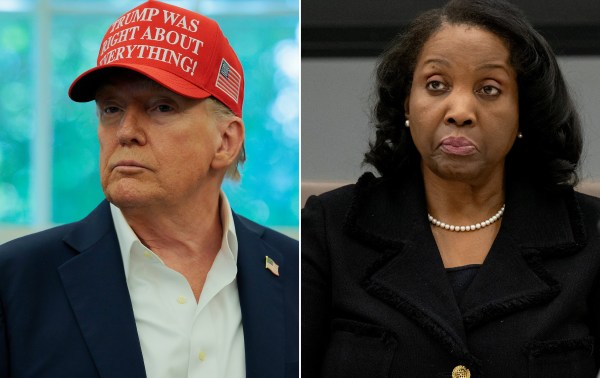Did you know that “Alligator Alcatraz” is the official name of the immigration facility that opened this month in the Florida Everglades?
It’s not a nickname, just as the “One Big Beautiful Bill” wasn’t a mock-Trumpian term for the legislation that recently passed Congress. That was the official title of the law until Chuck Schumer had it struck moments before it passed the Senate.
Naming an austere detention camp where conditions are reportedly horrible something as silly as “Alligator Alcatraz” is postliberal Republican politics in a nutshell. On the one hand, it dials up the cruelty to 11 in the belief that maximum ruthlessness is the key to good policy. Beefing up Immigration and Customs Enforcement and deporting people en masse isn’t enough to deter illegal immigration, you see; to make would-be border-hoppers think twice, what you really need is gigantic carnivorous reptiles.
But on the other hand, it’s deeply cringe. “Alligator Alcatraz” sounds like the premise of a schlock TV movie in the mold of Sharknado. It’s hard not to giggle when the president of the United States and the governor of Florida talk about it. That’s what I mean about it being postliberalism in microcosm: The idea is as serious as a heart attack yet difficult to take seriously.
As a non-paying reader, you are receiving a truncated version of Boiling Frogs. You can read Nick’s full newsletter by becoming a member here.
As if to underline the point, on July 1, the official White House Twitter account celebrated its opening with an AI-generated image of Donald Trump alongside three alligators in ICE caps.
That arguably wasn’t even the cringiest content posted by his deputies this month. On Wednesday, the Department of Homeland Security adapted a well-known meme of a skeleton with a barbell on its shoulders by adding the caption, “My Body Is a Machine that Turns ICE Funding into Mass Deportations.” Two days later, the White House Twitter account published an image of Superman above the slogan, “Truth. Justice. The American Way,” with Donald Trump’s face photoshopped onto the Man of Steel.
I don’t know about truth and justice, but he does represent the modern American “way,” I’ll give them that.
Then, on Thursday, Defense Secretary Pete Hegseth lapped the field by uploading a two-minute hype video about America’s drone program in which he spoke directly to the camera as drones whizzed around his head and “Enter Sandman” played in the background. It did in fact have “the same smarmy vibe as an ad for a local car dealer,” as Ron Fournier put it.
Menace and cringe have always been the main components of Trump’s politics, but it still seems odd that he and his deputies are leaning so hard on the latter nearly six months into his term. Amateurishly goofy nonsense is useful for grabbing eyeballs during a campaign, but less obviously useful during a presidency. Why are they still doing it?
Instinct, not strategy.
One way to answer that question is to reject the premise.
It’s not an issue of “why,” it’s an issue of “who.” Last fall, Americans chose to elect a kakistocracy led by a juvenile social media troll. Gratuitous sh–posting comes with the territory.
Asking why Team Trump continues to stoop to cringe is as nonsensical as asking why gators in the Everglades would chomp down eagerly on escaping illegal immigrants. You’re imposing a strategic frame on what’s ultimately a matter of base instinct.
This is an administration in which official presidential correspondence with foreign heads of state is indistinguishable from 3 a.m. Truth Social posts, replete with random capitalization, all-caps for emphasis, and exclamation points. In the same way that Trump’s physical preferences have created the phenomenon of “Mar-a-Lago face,” his communication style has reduced various federal spokesmen to sounding like the brattiest 13-year-old in a Discord chat.
Still, events do seem to influence the amount of cringe that gets posted. The DHS skeleton tweet, for instance, appears to have been a reaction to the head-spinning bonanza of funding for immigration enforcement in the One Big Beautiful Bill. How do you celebrate Congress showering ICE with more cash than most foreign countries spend on their militaries? If you’re the sort of stunted edgelord who’s morally comfortable working in a Trump administration, you fire up the meme machine.
Another example: Hegseth has had a rough go of things lately, and by “lately” I mean “since the moment he took the oath of office.” He’s a security risk; his department is in chaos; he stopped weapons shipments to Ukraine inexplicably and then forgot to tell the White House. Thom Tillis, who supplied a critical vote to confirm him in January, said a few days ago that he now regrets having done so. “With the passing of time, I think it’s clear he’s out of his depth as a manager of a large, complex organization,” said the senator, belatedly awakening to what was always glaringly obvious now that he’s no longer running for reelection.
At a moment like that, getting to babble to a camera about “drone dominance” over a Metallica soundtrack must have felt like a comfort to a former Fox News host like Hegseth, a return to his proverbial happy place. He may not have much to offer the Pentagon beyond vague musings about wokeness and “lethality” but he knows what sort of dreck gets populist pulses racing.
Whether from despair or exuberance, cringe is what the president’s deputies appear to reach for in moments of high emotion.
The medium is the message.
Another way to explain why Team Trump posts cringe is to shrug and observe that most political figures nowadays do.
Joe Biden’s staff posted this a few hours before he delivered the worst public performance by a president in American history. His party, including its highest-ranking officials, regularly posts trollish zingers aimed at the president and other Republicans. The most powerful Democrat in the House posted a gratuitous, tone-deaf glamour shot of himself a few days ago that featured one of the sloppiest Photoshop jobs in recent memory.
Like the gators in the Everglades, politicians have evolved over time to adapt to their environment. As politics (and news, and everything else) has moved online, they’ve moved with it. Social media has a flattening effect on public discourse by placing public servants in direct contact with their constituents, incentivizing them to speak in less bureaucratic and more relatably colloquial ways. Inevitably, that means memes, sick burns, videos conspicuously designed to go viral, and other forms of attention-seeking Internet flotsam—cringe, in a word.
All of that is tangled up in Donald Trump’s stupendous rise to power. The man met the technological moment in 2016, offering lowbrow populism in plainspoken terms at a moment when national politics was being democratized by social media. Where there’s a public demand, ambitious strivers will rush to meet it: I doubt there’s a single member of either party’s professional class that hasn’t looked at Trump jealously at some point during the last decade and thought, “I could be as stupid as that if I tried. Maybe stupider.”
In a few cases, formerly respectable members of Congress have been so seduced by the online attention economy that their self-abasement seems less a matter of pandering to voters than having had their brain circuitry rewired. Sen. Mike Lee has sunk so deeply into sh–posting ignominy that the leadership of the Mormon church has reportedly discussed staging an intervention. Rep. Nancy Mace came to Congress in 2021 posturing as a centrist grown-up in her party, only to become a full-time performance artist less dignified and more desperate for buzz than even Marjorie Taylor Greene.
Trump and his staff may be more prone to posting cringe than the average politician, or it may be that their contributions stink more intensely because they demean the office of the presidency. But how can one blame them for reverting to form since returning to the White House when mastering that form helped deliver them to the White House in the first place?
“Stick with what you know,” as the saying goes. If there’s one thing a tinpot populist demagogue and his flunkies know, it’s cringe.
Strategery.
Having said all that, I do think there are a few genuine political benefits the president and his administration gain from garbage like Superman photoshops and “Alligator Alcatraz.”
One is that it takes the edge off of policies that might otherwise alarm swing voters.
Yesterday, Jonathan Last placed Florida’s attempt to turn illegal immigrants into gator bait in a larger authoritarian context: Secret immigration policemen are snatching people off the streets, religious services are being driven underground, and children are being rendered (temporarily) stateless under Trump’s executive order suspending birthright citizenship. “You know it’s bad when white people are walking around with their f—ing passports,” one labor activist in Los Angeles told our own Kevin Williamson.
Scary stuff, especially in a country that’s already worried about the president’s dictatorial aspirations. And yet … how scary can a guy who’s posting images of alligators wearing ICE hats really be?
Any other president would resent not being taken seriously, but for a figure as menacing as Trump, it’s an asset. He’s frightening but funny; he means it but he’s kidding; he’s grabbing power but it’s part of a show; it’s real life but it’s just trolling. “This stuff went from being ironic to a reminder we’re living under a third-world regime,” Richard Hanania said of Trump’s Superman post. That’s true—it’s right in line with MAGA’s national-savior strongman personality cult—but it would sound preposterous to most voters, I suspect. The president posting a goof of himself as a superhero is “third world”? Lighten up, man.
Another virtue of cringe is that it signals to his populist fans that they, and he, are truly in charge.
The fact that other presidents wouldn’t say the things Trump says, engage with other world leaders the way he engages, or post the nonsense he routinely posts is very much the point. Behaving like a civic slob isn’t merely something he does by nature; it’s shorthand to show MAGA that he really has ended business as usual in Washington. His voters might prefer a president in the abstract who doesn’t capitalize words for emphasis in official correspondence like a teen girl texting a friend, but what they want more than anything else is for someone to shake up “the system.” Well, making a teen girl president certainly accomplishes that.
This, I think, is the core reason that the Great Epstein Disappointment is dogging Trump among his fans. It’s not the particulars of Epstein’s crimes, it’s the fact that they’ve always regarded the president as one of “us,” not one of “them”—and yet here he is, pulling the same nothing-to-see-here routine that “they” always do. Posting cringe is his way of reminding them periodically that he remains part of “us.”
Which brings us to a third, related benefit of cringe. The more clownish and embarrassing politics becomes, the more electorally viable fringe figures who are simpatico to Trumpist populism will be.
One of the president’s great frustrations in his first term was that he was surrounded by traditional, i.e., not insane, Republicans. He wanted like-minded deputies in his second term and spent the four-year interregnum period in his presidency marginalizing conservatives in the party and elevating toadies, cranks, and nationalist ideologues to replace them. One small contributing factor to that effort (even during his first term) was to normalize belligerent sh—posting as a hallmark of strength and to demonize Romney-esque decorum as evidence of weakness and inauthenticity. The right-wing battle cry of “he fights!” has always mostly meant “he trolls!”
I’ll spare you the usual lecture here about America’s frogs being “boiled” as Trump gradually desensitizes them to feelings of shame and instead point you to our country’s newest nominee for an ambassadorship, a ludicrous social media blowhard known for trumpeting his love of Hooters and his pride in being an “alpha male.” No one blinked when that nomination was announced on Thursday. Without a decade of the president building up the right’s tolerance for embarrassment with daily doses of cringe, I doubt that a corrupt slug like Ken Paxton could compete with John Cornyn in a Texas Senate primary. As it is, Paxton leads by nearly 20 points.
The right has shed every bit of its dignity in order to accommodate the president. Because it has, gonzo populism will be competitive for high office in America for years to come.
Myopia.
The great risk of cringe for a politician is myopia, which is what happened to Mike Lee.
Pleasing his social media following has become a priority for him so paramount that he saw nothing wrong with using a political assassination last month as an excuse to mock leftists. When Democratic Sen. Tina Smith of Minnesota confronted him about it, she said Lee seemed genuinely surprised to be called onto the carpet.
I bet he was, too. His populist fans on Twitter no doubt loved the mockery. And if they loved it, the rest of the world must have too, no?
Trump is playing with the same sort of fire. Alligator Alcatraz is top-notch Fox News fodder, exactly the sort of thing to set Jesse Watters’ heart aflutter. It’s such a sublime example of populist politics, in fact, that I wonder if the White House isn’t hyping it in order to distract the right from some of the president’s policy failures. Illegal immigrants are being arrested in droves, sure, but deportations are lagging. And for all the noise about ICE raiding workplaces, Trump sounds like he’s prepared to back off on sending migrant labor home to Mexico and Central America.
Cringe like Alligator Alcatraz may be an attempt to scratch the right’s itch to own the libs superficially at a moment when the president isn’t doing it substantively.
That’s where the myopia comes in, though. Trumpers might revel in the thought of gators dining on asylum-seekers, but a new Gallup poll captures an eye-popping shift across the wider public. Support for reducing immigration has dropped 25 points in the span of a year, with a record high of 79 percent now saying that immigration is a “good thing” for the United States. All three partisan groups have seen a jump in that number, but none more so than Republicans, of whom 64 percent now call immigration a “good thing” after 39 percent said so in 2024.
There are all sorts of ways to explain that. Maybe the right’s hostility to immigration was a temporary election-year thing driven by its desire to reelect Trump. Now that he’s been elected, they can safely revert to their actual beliefs. Or maybe Trump has convinced Republicans that illegal immigration has been solved (or will be imminently), causing them to think of “immigration” going forward exclusively in terms of the legal variety. Plenty of right-wingers support that.
But there’s an obvious third possibility, which I wrote about a few weeks ago: that Trump’s ostentatious ruthlessness about ridding the country of illegals has alienated many “soft” supporters who pulled the lever for him last fall. Not everyone who supported the president in November has a bottomless appetite for ghoulishness at immigrants’ expense. Many, I’m sure, are unpleasantly surprised to see the White House training its administrative fire not on violent criminals but on landscapers and restaurant dish-washers.
Gleeful, needless cruelty about siccing alligators on detained immigrants seems lab-designed to further alienate those people. Like Mike Lee’s assassination tweets, it’s superb cringe—but, like Lee’s tweets, it lays bare the rotten soul of MAGA populism. Sometimes, a little decorum goes a long way.








Please note that we at The Dispatch hold ourselves, our work, and our commenters to a higher standard than other places on the internet. We welcome comments that foster genuine debate or discussion—including comments critical of us or our work—but responses that include ad hominem attacks on fellow Dispatch members or are intended to stoke fear and anger may be moderated.
With your membership, you only have the ability to comment on The Morning Dispatch articles. Consider upgrading to join the conversation everywhere.